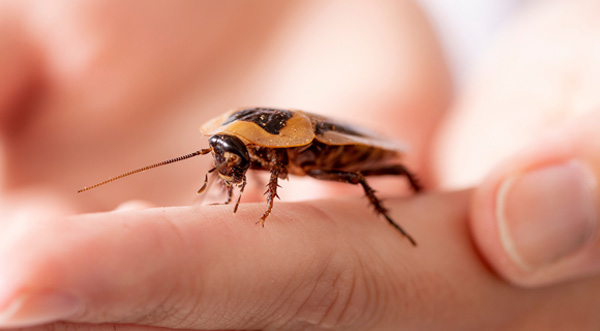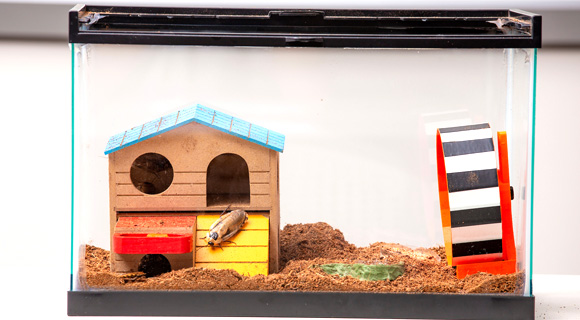Dr. Darby Proctor’s Florida Tech Roach Lab Provides Students With Unique Learning Experience
By Maria Sonnenberg // July 14, 2021
roach of choice is Blaberus discoidalis, a non-invasive species from the Caribbean

BREVARD COUNTY • MELBOURNE, FLORIDA – Florida Tech has a roach issue, but that is not a bad thing, since these insects are providing students with a unique learning experience, courtesy of Dr. Darby Proctor’s Roach Lab.
Proctor, an assistant professor of psychology at Florida Tech’s College of Psychology and Liberal Arts, teaches behavior and neuroscience to undergraduate psychology classes with the help of the residents of the Roach Lab.
She wanted something to liven up lessons, and she got it. No one falls asleep or reaches for the cell phone at her Roach Lab.
Relying on roaches instead of on rats or pigeons as, well, guinea pigs, is a no-brainer, according to Proctor.
Vertebrates are costly to purchase and maintain and their ultimate fate after the end of experiments carries ethical concerns.
Roaches, on the other hand, are cheap to keep and very few folks, if any, lose sleep over the scientific use of a creature many people squash at first sight.

“There are not many ethical concerns with roaches,” said Proctor.
These roaches may well pave, or scurry, the way to a new type of animal lab.
For Proctor, the roach of choice is Blaberus discoidalis, a non-invasive species from the Caribbean. At two inches, they are big enough to handle, yet they do not fly, thus not spooking students.
In some experiments, Proctor and her students outfit the insects with a teeny, tiny backpack brimming with electrodes that can manipulate the neurons and electricity that moves the creature’s antennae.
“We highjack the neurons in their antennae,” said Proctor.

The insects are fooled into believing they have run into something and therefore turn.
Using an iPad, students can see the process. The experiment provides a visual explanation of how muscle input works in robotic prosthetics used with humans.
Ever eager to engage the roaches in more research, Proctor encouraged students to design experiments that would illustrate concepts in animal behavior and comparative animal cognition classes.
Students created a maze of Lego blocks, where a treat rewarded the insect for a job well done. Alas, the roaches did not take the bait, but that is still okay, for as Proctor notes, “every time you fail, you learn something new.”
Since she launched the Roach Lab in 2017, only one student flat-out refused to work with the insects.

“Most students take to them pretty quickly,” said Proctor.
A misunderstood insect, roaches inhabit the planet in 4,500 different species. Although they have a reputation for carrying disease, they are rather clean if given the right living conditions.
“Roaches are pretty fastidious,” said Proctor.
The bugs’ habits remain a mystery to many, primarily because we have been so intent in destroying them, not in discovering what makes them tick.
“We know a lot about how to kill roaches, but don’t know much about their behavior,” said Proctor.
To further raise awareness of roaches and their place in science, Proctor developed roachlab.org, a website that offers tips for universities and other groups interested in implementing roach experimentation.

Resources listed range from “Disney’s Animal Kingdom Blaberus discoidialis Husbandry Guide” to the website for Backyard Brains, which sells neuroscience equipment designed to be used with roaches.
Proctor has also shared some of the Roach Lab roaches with Eastern Florida State College, Georgia State, Bucknell University and Drake University to help faculty establish roach-based research.
The Roach Lab denizens enjoy an upscale existence, for a roach. Under the daily care of PhD student Amanda Rose Newton, the Florida Tech roaches live in a 3-D printed house with clean pine shavings and even a hamster wheel for stimulation.
“They can climb and hide in the bedding,” said Proctor.
“We are not yet sure if roaches can get bored, but being in psychology, we don’t want our roaches to get bored.”
When their days of experimenting are over, the roaches are allowed to live out their golden years, which is about two for a roach, in leisurely retirement. They are fed a commercial cricket diet and dry dog food.
The initial stock cost a dollar apiece online from Joe’s Bugzs, which sells them as feeder insects for reptiles, but since that initial outlay, the university has not had to invest in roaches. These bugs breed like bunnies.
“We can’t stop them from breeding,” said Proctor.
She tried keeping boy and girl roaches separated, but that did not work out, as Proctor discovered that female roaches go for asexual reproduction when the guys are not to be found.
“They’re essentially cloning themselves,” said Proctor.














